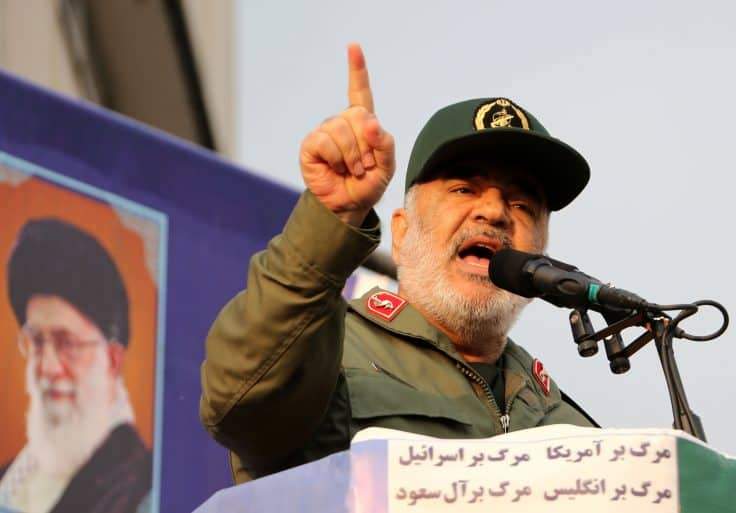Iran’s Launch of Military Satellite a Cover for Nuclear Weapons Advancement, According to U.S. Officials

Iran's launch Wednesday of a military satellite that it says will be used to conduct "intelligence warfare" against the United States violates international accords and represents a significant step forward in the Islamic Republic's ballistic missile program, U.S. officials told the Washington Free Beacon.
Iranian military officials claimed they successfully launched a satellite into space that enables the country's Islamic Revolutionary Guard Corps (IRGC) to track Western forces across the globe.
Major General Hossein Salami, the IRGC's chief commander, announced his forces completed the launch of the nation's first-ever Noor-1 satellite, which he said "creates powerful grounds for us in intelligence warfare."
As the coronavirus pandemic has ravaged Iran, its ruling regime has spent billions on foreign military intervention and its nuclear infrastructure. Wednesday's launch was an attempted show of force by Iran that marks a significant step forward in its military efforts even as U.S. sanctions cripple the country's economy.
"Iran's space program is clearly a cover for its intercontinental ballistic missile aspirations," Brian Hook, the administration's special representative for Iran, told the Free Beacon. "Any claims that Iran's space program is peaceful are pure propaganda."
The Trump administration is closely tracking the launch and says Iran is using its space program as a front to continue its illicit development of a ballistic missile, which could carry a nuclear payload great distances.
"Iran has long pretended its space program is peaceful in nature. Their admission this was a military launch shows they have been lying about their intentions," a State Department official told the Free Beacon. "It's particularly striking that a Foreign Terrorist Organization—the Islamic Revolutionary Guard Corps—was responsible for the launch and has now proudly announced itself as a ‘space force.'"
The launch of this satellite "poses a significant proliferation concern" to the United States, which will seek to hold Iran accountable for this major military escalation.
"This vehicle incorporates technologies identical to, and interchangeable with, ballistic missiles, including longer-range systems such as intercontinental ballistic missiles," the State Department official said.
While Iran has long used its space program to perfect ballistic missile technology, this is the first military satellite the country has launched.
"Today, we can observe the world from space and this is a great achievement for IRGC to expand the strategic intelligence of its defense force," Salami was quoted as saying in the country's state-controlled press.
Iran says it will use this technology to monitor Western forces, particularly the United States, which has been ratcheting up pressure through sanctions on Tehran for its support of terrorism.
"The placement of this multi-purpose satellite in orbit, both in the field of I.T. and intelligence battles, can produce strategic added value for us, and it creates powerful grounds for us in intelligence warfare," Salami said.
U.S. officials concluded that the launch of this military craft violates United Nations Security Council resolutions barring Iran from developing ballistic missiles and launch technology that could be used to power a nuclear device.
"We will continue to use all the tools at our disposal to prevent Iran's further advancement of its missile program, particularly efforts to refine or develop such technology through its launches of satellites," the State Department official said.
The Iranian regime has been eager to display its military might as the coronavirus ravages the country and calls into question the hardline regime's ability to lead. The Trump administration described the regime's behavior as reprehensible.
"When the Iranian people are suffering and dying from the coronavirus pandemic, it is jarring to see the Iranian regime focus their resources and efforts on these highly provocative military pursuits, instead of caring for their people," the State Department official said.
Photo: Iranian Revolutionary Guards commander Major General Hossein Salami / Getty Images




